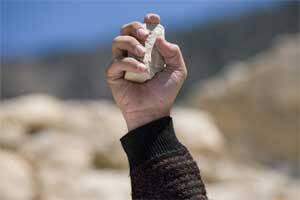A few years ago, I read an article in the New Yorker that described the barbarism of certain aspects of Shari’a law. The author detailed how, in many Middle Eastern countries, Muslim men use the prescriptions in the traditional Islamic legal code to terrorize, brutalize, and in extreme cases, kill women who, they claim, have committed sexual offenses. According to the article, some of the victims are put to death by their own brothers and fathers!
I was appalled by the article when I read it, but I confess that its impact was short-lived. It came roaring back to me the other night when I saw the devastatingly powerful film “The Stoning of Soraya M.” The movie is based on the true story of a young woman who lived in a small Iranian village during the years just following the Khomeini revolution of 1979. Soraya was caught in a dreadful situation: her husband, who beat her regularly and cheated on her, wanted to put her away and marry another woman. When Soraya refused to grant him the divorce, her husband conspired with the mullah of the village, the mayor and several other men to accuse her of adultery, though she was utterly innocent of the charge. When the accusation became public, Soraya raised her voice in protest, but her complaint carried no legal weight under Shari’a law, and the council of the village, composed exclusively of men, condemned her to death by stoning. The depiction of Soraya’s execution is overwhelming. She is buried to her waist and her hands tied behind her back. The first stones are thrown by her own father and by her two pre-adolescent sons. Next, her husband attacks her and then all of the men of the town rain stones upon her, as they chant Allahu akhbar (God is great).
I realize how dangerous and delicate it is to raise a matter such as this. It is extremely easy to fall into the trap of tsk-tsking and tut-tutting at the objectionable practices of another religion without admitting to the outrages of one’s own. And I fully admit that our own religious traditions are anything but blameless. The most casual glance at the Book of Leviticus discloses that ancient Israel certainly accepted a legal code that sanctioned lethal violence—burning and stoning—for various offenses. And I humbly confess that Christians, over the centuries, have done terrible things in the name of Christ: the burning of witches, the torturing of heretics, the slaughter of non-Christians, to name just a few. Nevertheless, the events described in “The Stoning of Soraya M.” are not from ancient history; they took place a few decades ago. And the imposition of Shari’a law is a lively issue in a number of countries today. So what do we do with a movie such as this?
Though Christians rarely have lived up to it, there is an ideal at the heart of the Gospel that represents a permanent challenge to the travesty of justice on display in the story of Soraya. As the film came to its bloody climax, I found myself haunted by the story told in John’s Gospel of the woman caught in adultery. Many of the dynamics of the Soraya narrative are evident in this account: a woman accused of a sexual offense, the formation of an angry mob, the sanctioning of violence through religious authority, the thrill that comes through scapegoating. But then there is the decisive difference. When the religious leaders of the mob—thirsty for blood and confirmed in their self-righteousness—inquire of Jesus what he would recommend, the young rabbi bends down and writes on the ground. Then he stands up and says, “Let the one among you who is without sin be the first to cast a stone at her” (Jn. 8: 7). This devastating one-liner causes the elders to drop their stones and prompts the crowd to dissipate like a summer cloud. Jesus doesn’t sanction scapegoating violence; he interrupts it. He demonstrates that God stands, not on the side of victimizers, but of victims. And this divine solidarity with victims comes to its richest expression when Jesus becomes himself an innocent victim of a religiously sanctioned scapegoating mob.
The French philosopher René Girard has argued that all dysfunctional human societies—from coffee klatches to nation states—are predicated upon the scapegoating mechanism, that is to say, the tendency to find someone or some group to blame. In its shared hatred, the group finds a satisfying, though ultimately unstable, unity. One of my colleagues at Mundelein Seminary has summed up the Girardian insight as follows: “Wherever two or three are gathered, look for victims.” Girard identified the first revelation (re-velatio, or unveiling) of Christianity as precisely this uncovering and de-legitimizing of the scapegoating mechanism, and the second as the manifestation of the God who is friend to the victim.
What particularly gripped me as the movie came to its conclusion was this: Soraya, devout Muslim and innocent victim of mob violence, lying dead in a pool of blood, is one of the most powerful Christ figures in recent cinema.








